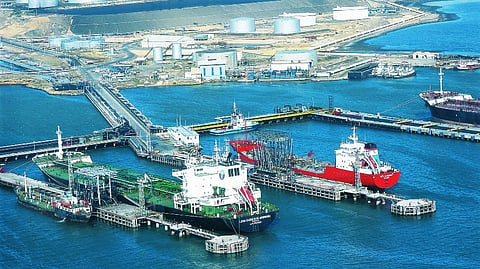Venezuela's oil exports rose in February ahead of Chevron's license termination
Venezuela's exports of crude and fuel rose in February to their highest since November, vessel monitoring data showed, as the US prepared to terminate a key license that allows oil major Chevron to operate and ship crude from the country.
Venezuela's oil output and exports have grown since Chevron was granted the license in late 2022, providing a reliable source of revenue to President Nicolas Maduro's administration. The company in January shipped to the US more than 30 per cent of the South American nation's total exports.
On Tuesday, the US Treasury Department ordered the wind-down of Chevron's activities in Venezuela in the next 30 days, after President Trump accused Maduro of not making progress on electoral reforms and migrant returns.
Venezuela's state energy company PDVSA and its joint venture partners last month exported an average of 934,465 barrels per day (bpd) of crude and fuel. China remained the largest market of Venezuela's oil, receiving some 503,000 bpd, according to the data.
The US was the second largest receiver with 239,000 bpd, followed by Europe with 69,200 bpd and India with 68,000 bpd. Chevron's exports to the US and other destinations from its joint ventures fell to 252,000 bpd in February from 294,000 bpd the previous month.
Venezuela's political ally Cuba, which is struggling to keep the lights on during a severe energy crisis, received some 42,000 bpd of crude and fuel.
Venezuela also exported 315,000 tonnes of oil byproducts and petrochemicals, including methanol and urea, a decline from the 360,000 tonnes shipped in January.
The country imported 86,000 bpd of fuel through swaps with PDVSA's partners, a decline from the 132,000 bpd of January, the data showed.
Since Washington first imposed oil sanctions on Venezuela in 2019, PDVSA has relied on little known intermediaries that buy its oil at price discounts and provide it to China. They also charge PDVSA costly fees for freight, ship-to-ship transfers and discharge.
With no incentives to continue delivering cargoes to Chevron under the new license's terms, which are yet to be detailed by the US Treasury, PDVSA is expected to send more oil to China through those intermediaries in the coming months, analysts have said.
US refiners of heavy crude, particularly in the Gulf of Mexico, are expected to feel the hit of the license withdrawal, which is happening at the same time Trump imposes tariffs on Canada and Mexico, the top suppliers of oil to the US.
(Reporting by Marianna Parraga; Editing by David Gregorio)


